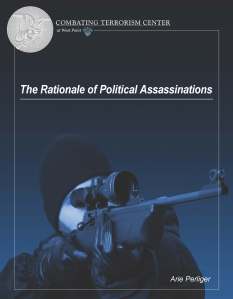The current study aims to improve our understanding of the causes and implications of political assassinations by employing quantitative analyses on a comprehensive data set. The findings illustrate the trends that characterize the phenomenon and challenge some of the existing conventions about political assassinations and their impact.
This study puts forth the rationale that the logic of political assassinations is different from that of other manifestations of political violence. Hence, it is important to understand the unique factors that may encourage or discourage violent groups or individuals from engaging in political assassinations. Moreover, it seems reasonable to assume that these factors vary among different types of assassinations, because in most cases the characteristics of the targeted individual shape the nature and objectives of the assassination. Indeed, this study establishes that different processes trigger different types of assassinations, and that different types of assassinations generate distinct effects on the political and social arenas.
 Skip to content
Skip to content

